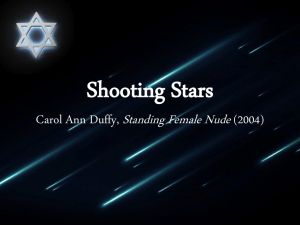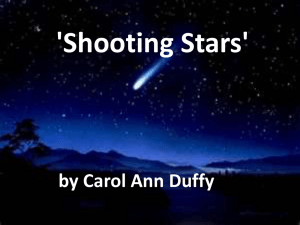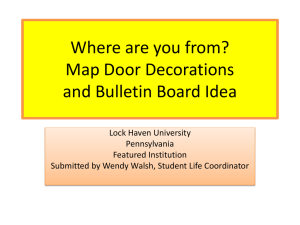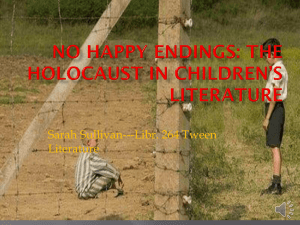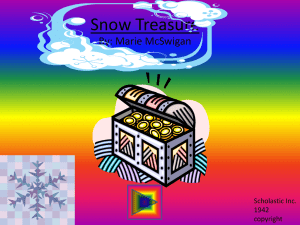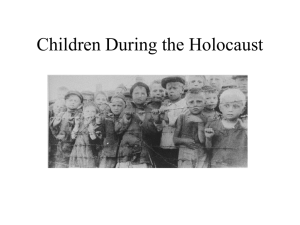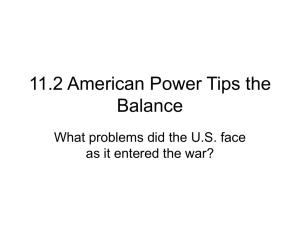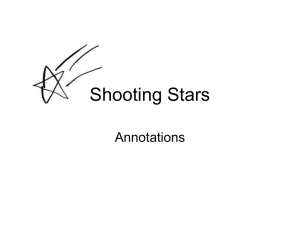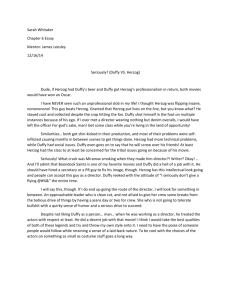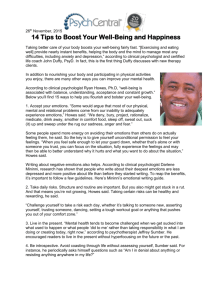Shooting Stars
advertisement
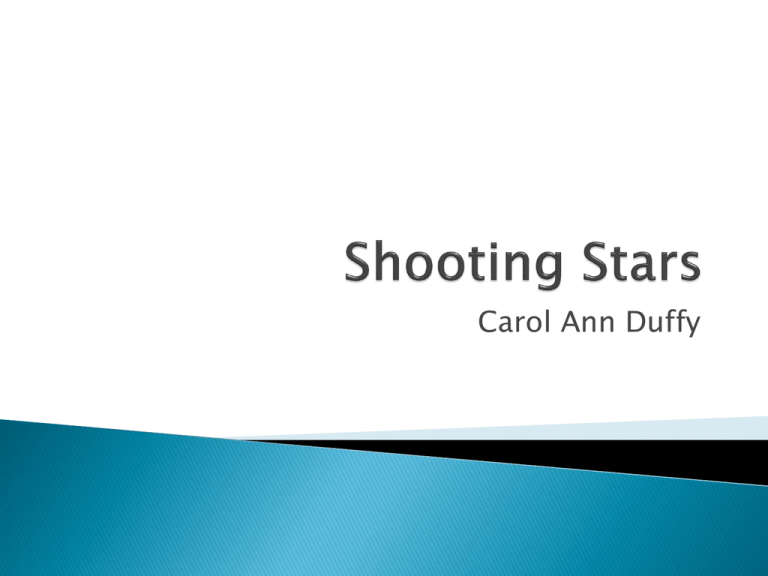
Carol Ann Duffy The Nazi Holocaust 1939 – 1945 Link to a particular place and time Europe 1939 – 1945 The concentration camps where an estimated 6 million Jews met their deaths “I sang the ancient psalms at dusk inside the wire and strong men wept” Have we learned the lesson of history? “After the history lesson children run to their toys the world turns in its sleep …” Persecution – “acts of torture” Bravery “ Upright as statues, brave” Remembrance “ Remember these appalling days” Passage of time “If seas part us, do you not consider me?” ‘Shooting Stars’ Duffy uses ambiguity here. The title has several different meanings. 1. The Star of David- national symbol for Jews, but also used by the Nazis as an identification badge on Jewish people’s clothing, or tattooed on their bodies. 2. Sense of the temporary nature of life in metaphorical comparison of people to meteors/shooting stars. 3. Outstanding individuals have been annihilated. 4. Irony as shooting stars are often associated with beauty and good luck. After I no longer speak they break our fingers to salvage my wedding ring. Rebecca Rachel Ruth Aaron Emmanuel David, stars on all our brows Beneath the gaze of men with guns. Mourn for our daughters, ‘After I no longer speak’ Euphemism for the narrator’s death. From the poem’s outset, it is established that she is speaking form beyond the grave. The Nazis robbed their victims of voice. Through her poetry, Duffy attempts to restore one of those voices; her poem is an act of remembrance and resistance. ‘they break our fingers to salvage my wedding ring.’ Word choice of ‘break’ and ‘salvage’ make it appear that the woman is but scrap to the Nazis. Her life is of less value than her ring. The wedding ring would traditionally be a symbol of love and companionship. Rebecca Rachel Ruth Aaron Emmanuel David, This is a list of traditional Jewish forenames. It is unpunctuated, suggesting that the Nazis are seeking to rob the Jewish people of their individual identities. It also mirrors the overwhelming number of victims. stars on all our brows This suggests that the prisoners have had stars of David tattooed on their foreheads. The soldiers will literally be shooting stars upright as statues, brave. You would not look at me. You waited for the bullet. Fell. I say, Remember. Remember those appalling days which make the world forever bad. One saw I was alive. Loosened upright as statues, brave. This simile conveys both the courage and the fear of the women meeting their deaths at the hands of the Nazis. Petrified-to feel extreme fear- comes form the Greek word petros, meaning rock. The women are frozen with fear, but are also robbed of their life, much like a statue is an inanimate object. “You would not look at me. You waited for the bullet. Fell.” The woman addresses her friend. ‘Fell’ conjures up an image of the friend being shot and also is a euphemism for soldiers who die in battle. However, these women are not armed combatants: they are defenceless victims. “Remember. Remember those appalling days which make the world forever bad.” Repetition and capitalisation of ‘Remember’ at end of sentence emphasise its importance. Duffy is drawing attention to the need for the whole world to avoid a repetition of the Holocaust. Yet, for the persona there is no possibility of redemption. his belt. My bowels opened in a ragged gape of fear. Between the gap of corpses I could see a child. The soldiers laughed. Only a matter of days separate this from acts of torture now. They shot her in the eye. One saw I was alive. Loosened his belt. Enjambment across two stanzas is used to introduce the horrific rape of the persona. Rape is often used as a weapon in war. My bowels opened in a ragged gape of fear. In this metaphor Duffy concentrates on the physical effects of rape. Terrorised by the sexual attack, the woman soils herself. A gape can be a wide opening, but it usually describes a facial expression. This suggests that the attack erases the woman’s identity. ‘Between the gap of corpses I could see a child.’ Children symbolise life, hope and renewal. This acts as a temporary relief form the brutality of the rape. However, this is removed when the child is murdered. ‘Only a matter of days separate this from acts of torture now’ A very short period of time is used to suggest the immediacy and relevance of these events. How would you prepare to die, on a perfect April evening with young men gossiping and smoking by the graves? My bare feet felt the earth and urine trickled down my legs. I heard the click. Not yet. A trick. with young men gossiping and smoking by the graves? The deaths do not seem to affect the soldiers. The act as normal. The word choice of ‘gossiping’ suggests actions of little consequence. How would you prepare to die, on a perfect April evening April symbolises life and rebirth. Here there is an ironic contrast with the murders taking place. This line balances the impulses of life and death. My bare feet felt the earth In contrast to the desensitised, jackbooted soldiers, the woman is sensitive to the earth. Duffy suggests a connection between the victims and nature. The Holocaust is a violation of nature. and urine trickled down my legs. I heard the click. Not yet. A trick. Internal rhyme and onomatopoeia are used to mimic the sound of a gun being fired. Short sentences are used by Duffy to heighten the tension. After immense suffering someone takes tea on the lawn. After the terrible moans a boy washes his uniform. After the history lesson children run to their toys the world turns in its sleep the spades shovel soil Sara Ezra… This stanza asks us to question how any real normality can return after such horror. The use of anaphora/repetition of ‘After’ emphasises the contrast between the terrible events that happen and the almost immediate return to domesticity. After immense suffering someone takes tea on the lawn. Contrast between the emotive word choice of ‘immense suffering’ and the banality of ‘tea on the lawn’. After the terrible moans a boy washes his uniform. The second part of this sentence is ambiguous. It could refer to Nazi soldiers, many of whom were little more than boys. However, it could also refer to a boy washing his school uniform. There is a clear sense that the memory of the suffering of the Jews (represented by ‘terrible moans’) is being washed away. After the history lesson children run to their toys Children are taught about The Holocaust at school, but choose to escape to more trivial things. This wilful ignorance is mirrored by a world that ‘turns in its sleep’. This suggests that we choose to ignore the painful truth of the past. turns in its sleep the spades shovel soil Sara Ezra… Sibilance phonically represents sleeping forgetfulness, while the reintroduction of Jewish forenames reminds us that the Holocaust had real victims. Again the list is unpunctuated. The ellipsis at the end of the stanza reminds us that the list could go on and on. Sister, if seas part us, do you not consider me? Tell them I sang the ancient psalms at dusk inside the wire and strong men wept. Turn thee unto me with mercy, for I am desolate and lost. This stanza takes us back to the interior of a concentration camp. Sister, if seas part us, do you not consider me? Moses parted the Red Sea to lead his people away from the Egyptian Army and to safety. Tell them I sang the ancient psalms at dusk inside the wire and strong men wept. ‘ancient psalms’ are songs from the Old Testament. They have particular significance for the Jewish people. Also, many of the psalms share themes of forbearance and strength when faced with adversity. There is also often an absolute faith in God as a deliverer. Turn thee unto me with mercy, for I am desolate and lost This comes from the twenty-fifth psalm. It pleads with God for deliverance form shame and death. The woman keeps faith with her religion, but the most desperate parts of the psalm are quoted.
